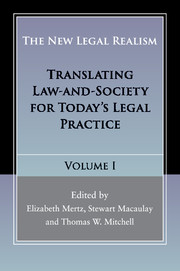Book contents
- Frontmatter
- Contents
- List of contributors
- Preface to The New Legal Realism, Volumes I and II
- 1 Introduction: New Legal Realism: Law and Social Science in the New Millennium
- Section I THE PLACE OF NEW LEGAL REALISM IN LEGAL THOUGHT AND TEACHING
- Section II PHILOSOPHY AND METHODS FOR A NEW LEGAL REALISM
- Section III NEW LEGAL REALIST TRANSLATIONS
- Index
- References
1 - Introduction: New Legal Realism: Law and Social Science in the New Millennium
Published online by Cambridge University Press: 05 May 2016
- Frontmatter
- Contents
- List of contributors
- Preface to The New Legal Realism, Volumes I and II
- 1 Introduction: New Legal Realism: Law and Social Science in the New Millennium
- Section I THE PLACE OF NEW LEGAL REALISM IN LEGAL THOUGHT AND TEACHING
- Section II PHILOSOPHY AND METHODS FOR A NEW LEGAL REALISM
- Section III NEW LEGAL REALIST TRANSLATIONS
- Index
- References
Summary
A mystery has persisted from the end of the Legal Realist era in the United States until the present day. How can it be that legal scholarship and training, while fully acknowledging law's place in society, proceeds along an almost willfully ignorant path in terms of available empirical research on this issue? How can knowledge about what law practice is really like be relegated, even now, to a marginal status (along with the social scientists and clinicians who bring this knowledge into law training)? Almost everyone would concede that law as it plays out on the ground, in real life, cannot be understood by just reading Supreme Court opinions – or any court's opinions. However, the core analyses in many law review articles still focus primarily on the texts of those opinions, and often proceed as if the mere fact that a judge has ruled means that the ruling will have certain effects in the world – for example, that criminal defendants who have been “given” certain rights by a court will actually be accorded those rights in real life. Legal analyses still proceed on what everyone knows to be a fiction – that changing the words used in a legal opinion can automatically cause real change on the ground. For a long time now, social science scholarship has demonstrated that this is not true. For a brief period in the early twentieth century, the original Legal Realists made a dent in the consciousness of lawyers and legal scholars, asking them to think about how social context affects the delivery of law on the ground – and also about how real-world influences going far beyond doctrine might affect judges’ decision making. At the same time, they pushed for legal education that took seriously how lawyers practiced in the real world, laying the groundwork for clinical education to develop. And yet, although their insights were broadly accepted, the central world of legal analysis soon returned to its accustomed, largely abstract form of scholarship and reasoning.
This volume is dedicated to tackling that persistent mystery, and even more to moving the interdisciplinary discussion envisioned by the original Realists forward into the new millennium.
- Type
- Chapter
- Information
- The New Legal RealismTranslating Law-and-Society for Today's Legal Practice, pp. 1 - 26Publisher: Cambridge University PressPrint publication year: 2016
References
- 8
- Cited by



